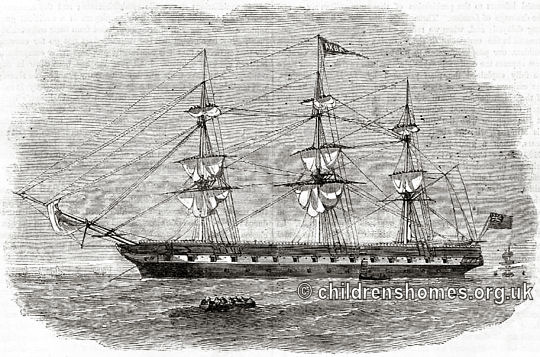Reformatory Ship 'Akbar', Birkenhead, Cheshire
On January 3rd, 1856, the Akbar — a former naval 'hulk' moored off Rock Ferry, Birkenhead — was officially certified for use as a Reformatory School Ship. It could accommodate 200 boys, aged 14 to 16, from any locality, who had been committed to detention for a period of at least five years.

Reformatory Ship Akbar, 1856. © Peter Higginbotham
The Akbar was run by the Liverpool Juvenile Reformatory Association (LJRA) — a group of the city's merchants, ship-owners and other worthies. The Association subsequently established a reformatory for girls at Edge Hill and for boys at Newton-le-Willows.
The original Akbar was built in 1801, and from 1834 to 1855 had served as a quarantine vessel at Liverpool for travellers visiting the city. The ship was in a poor condition when taken over by the LJRA and required £2,000 spending on her. Even then, she was condemned just six years later and replaced by a second vessel which took over the Akbar name.
The boys aboard the ship were kept occupied in a number of ways. The decks were scrubbed repeatedly. The boys were taught tailoring and shoemaking and made and repaired their own clothes and shoes. In the early years, they picked oakum — teasing apart 'junk' (old rope) into its raw fibres, for which they were paid a shilling a hundredweight. Oakum picking was hard and dirty work, however, and abandoned in 1862. For recreation, they played draughts or bagatelle, and read magazines such as the 'British Workman' and 'Band of Hope Review'. On Sunday, reading was largely confined to material with religious content. Like many ships, the Akbar had its own military-style band which performed at local events.
On September 25th, 1887, a mutiny took place on the ship. The Captain was absent at the tie and the 143 boys on board were in the charge of the Chief Officer. The trouble began when several boys refused to work and began roaming around the ship, arming themselves with sticks and whatever else they could find. The boys broke into the ship's store and then raided the Captain's cabin, stealing jewellery and other items. Seventeen of the boys escaped in a boat but were recaptured a few days later. Two of the ringleaders were sentenced to three months hard labour and refused re-admittance to the Akbar. Others involved, who were allowed back on board, were severely punished.
Due its deteriorating physical condition, the ship was scrapped in November 1907 and the boys were moved to a temporary camp at Heswall. In April 1909, the new Akbar Nautical School for Boys was opened in land-based premises at Heswall, which became notorious for the 'Akbar Scandal' that emerged there the following year.
Records
Note: many repositories impose a closure period of up to 100 years for records identifying individuals. Before travelling a long distance, always check that the records you want to consult will be available.
- Lancashire Record Office, Bow Lane, Preston, Lancashire, PR1 2RE. Holdings include Admission register (1939-1951).
Bibliography
- Rimmer, Joan Yesterday's Naughty Children (1986, Neil Richardson)
- Evans, Bob The Training Ships of Liverpool (2002, Countyvise)
- Carridice, Phil Nautical Training Ships: An Illustrated History (2009, Amberley Press)
- Higginbotham, Peter Children's Homes: A History of Institutional Care for Britain's Young (2017, Pen & Sword)
Links
- None identified at present.
Except where indicated, this page () © Peter Higginbotham. Contents may not be reproduced without permission.


